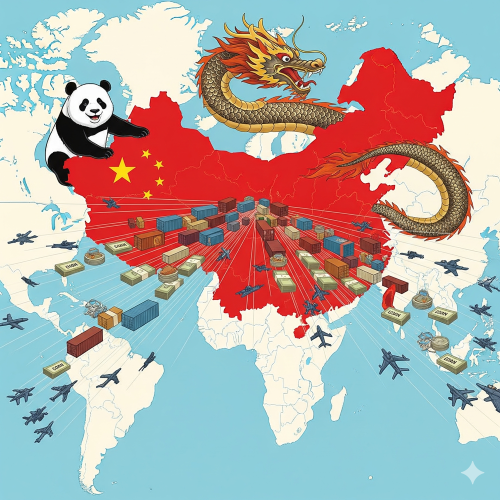What role do cyber espionage and intellectual property theft play in the U.S.–China rivalry?

Cyber espionage and intellectual property (IP) theft play a central and highly contentious role in the U.S.–China rivalry.
The U.S. government views these activities as a deliberate, state-sponsored campaign by China to gain a competitive advantage, accelerate its military modernization, and ultimately challenge U.S. global leadership.
This isn't just a matter of corporate espionage; it's a core component of China's national strategy.
China's "Military-Civil Fusion" and the Strategic Value of IP Theft
China's cyber espionage and IP theft are not isolated acts; they are integral to a broader, state-driven strategy known as "Military-Civil Fusion" (MCF). This policy, championed by Chinese President Xi Jinping, aims to seamlessly integrate the civilian commercial and research sectors with the military and national defense industries.
-
Avoiding the "Hard Slog" of Innovation: U.S. officials and intelligence reports have repeatedly stated that China steals American IP to avoid the billions of dollars and years of research required for original innovation. This allows Chinese companies, often state-owned or state-backed, to rapidly develop advanced technologies and compete unfairly with their U.S. counterparts. As FBI Director Christopher Wray put it, this is "one of the largest transfers of wealth in human history."
-
Military Modernization: Stolen IP is a key driver of China's military modernization. By acquiring sensitive U.S. defense technology, blueprints for advanced weapons systems, and designs for military robotics, the People's Liberation Army (PLA) can "leapfrog" generations of development and close the technological gap with the U.S. military. This directly impacts U.S. national security and threatens the lives of U.S. service members in a potential conflict.
-
Cyber Espionage as a Preferred Method: Hacking is China's preferred method for espionage. Cybersecurity firms and U.S. government reports have linked numerous cyberattacks to Chinese state-affiliated groups, often referred to as advanced persistent threats (APTs). These groups target a wide range of victims, including U.S. government agencies, defense contractors, academic institutions, and private companies across various industries, from technology and finance to energy and manufacturing.
Impact on the U.S. Economy and National Security
The impact of Chinese cyber espionage and IP theft on the U.S. is severe, with far-reaching consequences for both the economy and national security.
-
Economic Losses: U.S. government estimates place the cost of Chinese intellectual property theft at hundreds of billions of dollars annually. These losses include not only stolen trade secrets but also lost jobs, reduced innovation, and the erosion of U.S. competitiveness in key industries. The stolen technology allows Chinese companies to enter the market with a low-cost, high-tech product, undercutting American firms and taking away market share.
-
National Security Implications: The theft of military technology is a direct threat to U.S. national security. For example, hackers linked to the PLA have been accused of stealing proprietary chip architecture from U.S. defense firms, which could potentially allow them to compromise or defeat U.S. military robots and drones. This makes U.S. forces more vulnerable on the battlefield.
-
Erosion of Trust and International Norms: The persistence of these activities has damaged trust between the U.S. and China and has made it more difficult for the two countries to cooperate on other issues. It also raises concerns about whether China is a responsible stakeholder in the international system, as it appears to violate international trade agreements and norms of behavior in cyberspace.
U.S. Response and Legal Actions
The U.S. government has adopted a multi-pronged approach to counter Chinese cyber espionage and IP theft, including legal action, policy changes, and international diplomacy.
-
The China Initiative: In 2018, the Department of Justice launched the "China Initiative," a program aimed at prosecuting individuals and entities involved in theft of U.S. trade secrets and other national security threats from China. This led to numerous indictments and convictions against Chinese military officers, intelligence officials, and civilian hackers. While the initiative was later renamed, the focus on countering economic espionage from China remains a top priority.
-
Diplomacy and Agreements: The U.S. has used diplomatic channels to pressure China to end its state-sponsored hacking. In 2015, President Barack Obama and President Xi Jinping reached an agreement to refrain from conducting or knowingly supporting cyber-enabled theft of intellectual property. While this led to a temporary decline in such activities, U.S. officials later reported that the hacking resumed.
-
Policy and Legislation: The U.S. has also taken legislative steps, such as passing the CHIPS and Science Act and implementing export controls on advanced semiconductors, to make it more difficult for China to acquire U.S. technology.
These legal and policy responses reflect the U.S. government's conclusion that Chinese cyber espionage and IP theft are not a minor issue, but a critical and ongoing threat that fundamentally shapes the nature of the U.S.-China rivalry.
You can watch this video about two Chinese hackers charged by the Ministry of State Security for a global computer intrusion campaign.
- Questions and Answers
- Opinion
- Motivational and Inspiring Story
- Technology
- Live and Let live
- Focus
- Geopolitics
- Military-Arms/Equipment
- Безопасность
- Economy
- Beasts of Nations
- Machine Tools-The “Mother Industry”
- Art
- Causes
- Crafts
- Dance
- Drinks
- Film/Movie
- Fitness
- Food
- Игры
- Gardening
- Health
- Главная
- Literature
- Music
- Networking
- Другое
- Party
- Religion
- Shopping
- Sports
- Theater
- Health and Wellness
- News
- Culture

